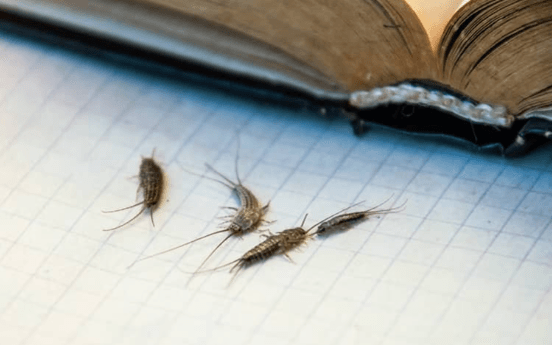


Silverfish Identification & Prevention
What are silverfish?

Silverfish earn their name from their fish-like movements, silvery color, and small, flat, tear-drop shape. They are notorious for reproducing rapidly, laying up to 20 eggs per day in some circumstances. Silverfish infestation signs include sightings of these pests, damage to fabrics or starchy items, and damage to food packaging in food storage areas.
A silverfish infestation is something no property owner wants to deal with. Learn more about silverfish and effective home pest control treatments by reviewing the answers to frequently asked questions below.
Are silverfish dangerous?
While silverfish won’t directly bite humans and don’t typically spread diseases, they might contaminate your food or food storage areas. As they scavenge for food, they will leave droppings behind on surfaces and in the food packaging itself, resulting in the risk of stomach illnesses. They may also trigger allergic reactions in certain people with sensitivities.
Silverfish are more dangerous to the starchy or stored items around your property, as they will chew their way through these and destroy any items or fabrics they can reach.
Why do I have a silverfish problem?
A silverfish problem manifests itself when your property has many of the factors that attract these pests, such as moisture and food sources like books, linens, and piles of dust. Silverfish also gravitate to pantry areas and packaged food. Eliminating or reducing access to these factors can help to prevent silverfish infestations on your property.
Where will I find silverfish?
Silverfish prefer to spend their time in damp, warm conditions, so they will most likely be around food storage areas, kitchens, bathrooms, and basements. Bathtubs and sinks are another prime space to find silverfish because they can’t climb out of these smooth surfaces.
Outside, silverfish love to hide under damp piles of leaves or debris, in long grass, under rocks, and around vegetable gardens.
How do I get rid of silverfish?
The best way to get rid of silverfish is to remove adult insects, their eggs, and any harborage areas found around your property. Our service specialists at Quality Pest Control can certainly help you with this, and we take a reliable, customized approach to the removal of the entire infestation of silverfish on your property.
How can I prevent silverfish in the future?
Prevent silverfish problems in the future by following our expert tips below on making your property less desirable to these pests.
- Vacuum interior areas often to remove dust, food particles, and any lingering insect eggs you might not have noticed.
- Address moisture issues around both the interior and exterior of your property, as silverfish love to be in areas that are humid or full of standing water.
- Make sure interior areas aren’t prone to humidity buildup by using dehumidifiers and ventilating closed rooms when possible.
- Store all leftover food properly and consider using airtight containers in food pantry areas to keep silverfish from scavenging in these spots.
- Seal up cracks around your property’s windows, doors, and foundation to keep silverfish from slipping inside and starting an infestation.
- Remove outdoor silverfish harborage areas by clearing away long grass, removing piles of debris such as fallen leaves or fruit, and storing woodpiles in elevated areas.
If you find that you are still struggling with a widespread silverfish infestation despite following these prevention tips, or if you have more questions about silverfish control in Omaha, don’t hesitate to reach out to Quality Pest Control for professional assistance and total silverfish removal.


Our Values, Your Peace of Mind
Why Choose Quality Pest Control?
-
Client-Focused Care
At Quality Pest Control, we pride ourselves on providing you with service that meets your needs. We take the time to listen to you and work with you to create a pest control plan that delivers the solutions you want.
-
Local Expertise
Quality Pest Control has been serving Omaha and the surrounding areas since 1996. We know the pests in our region and the most effective ways to treat them in order to eliminate and prevent them on your property.
-
Customized Services
No two pest control issues are exactly the same, so no two pest control plans should be either. We provide individualized treatment plans to every client we work with so that you receive the services you need for effective results.